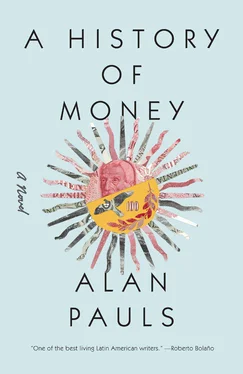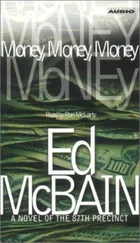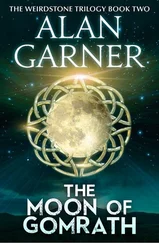But if his mother disdains his photos, that’s only because it’s a different secret that keeps her up at night; one that won’t be found in those stupid, poorly composed pictures, but elsewhere: encrypted in bank statements, in the sums of money that arrive to enlarge them every three months with Swiss regularity, even though nobody’s lifted a finger to bring them into existence. The money of the dead. This is what drives her crazy, and he knows it: Isn’t it what drives him crazy, too? Could there be a better, more perfect type of money? Cash that falls from the sky, that rains down of its own accord, without anyone winning it or taking the trouble to send it or claiming it; pure, beneficent cash from the beyond, as impersonal as the seasons, blossom, the tide. They share this unutterable envy, an envy from which there’s no solace and which reaches almost criminal heights in his mother — who, as a young woman, in a moment of harebrained inspiration during the stupefied interval between her two husbands, conceived a plan to seduce a jazz trumpeter, an affectionate, smooth-chinned guy, on the autism spectrum but extraordinarily prolific and capable of composing three flawless standards in the time it takes a taxi to drive him to the family company where he’s made to earn his keep. It’s awoken in them by the beneficiaries of rights and royalties, privileged creatures who are superior to any aristocrat or well-to-do bourgeois, and above all superior to the piranhas that make their killings on the money market: inventors and their children, authors and their descendants, the heirs of visionaries who had one idea and put it into action and sent it around the world, so that from then on it was the idea and not them, the visionaries, with their sweat, their tears, and their blood, whose existence would be dedicated to making money.
“Why?” his mother shouts (having put her sunglasses back on, as she does every time she suffers an attack of emotion) while reaching across the table, setting the bottle of oil swaying, and shaking him by the lapels of his tweed jacket — Sonia’s latest addition to his wardrobe. “Why the hell weren’t you an author? Why weren’t you a genius, a writer, a scientist, one of those precocious, sickly musicians who die young, before they’ve met a woman or had children, and leave the rights to all their work to their mothers?” If she talks with such fury and grief now, while she’s still enjoying the money from her dead people and all she has to do is wake up with an idea one morning and translate that money into whichever language she likes (it having already been translated from the package her father leaves her when he dies, when, yes, he’s an old man, but more significantly he’s full of poisonous rancor after submitting to half a dozen unsuccessful cataract operations, and is almost blind but still sufficiently clearsighted to realize before he dies that everything he’s leaving, the steel factory in Villa Devoto, the apartment in Belgrano R, the chalet in Miramar, the two cars, will be lost entirely, that in truth he’s leaving it to ruin and disaster), whether she wants to translate it into things, possessions, journeys, even ambitious undertakings like the Beast, which is initially just one of many investments that claim her dead relatives’ money, and then soon enough the main one and then the only one, so thoroughly does the project that starts as a summerhouse and ends up as a mansion-mausoleum, a palatial catastrophe, end up devouring everything she has, including money in the bank, of course, and also the apartment in Belgrano R, the chalet in Miramar, et cetera — if she talks like this now, while she’s still swimming in money, as the phrase has it, what will she say in seven, eight years’ time, when there isn’t a single drop of water left in the pool, when not much more remains of her dead relatives’ money than of everything else she’s managed to preserve of them — dust-encrusted fossils, vague memories, the distorted echo of a voice babbling nonsense in the dark.
Yes, inheriting has its appeal. As a former heir, an unborn heir, an heir who’s dead on arrival and whose calling is to wait for something that will never come to pass, he knows this firsthand. He knows the impatience, the unhealthy hunger, and the arrogance of those who know it’s only a matter of time. Sooner or later : the heir’s motto, the phrase every heir repeats at night as a talisman to calm the nerves before sleep, at the end of humbling days that demand now, immediately, what they still don’t have, what a heart attack, cancer, or a drunk bottle-truck driver turning a corner at full speed will someday give them — sooner or later. An heir’s laugh is acid and deafening. It’s the laugh of he who laughs last, a cackle of resentment and long-brewed vengeance that leaves nobody unscathed. But if only that were all there was to it. Because even inheriting carries a responsibility. You have to live up to an inheritance. If his mother gives in to the widow’s pull on her despite her natural reserve and the armor-plating provided by her pride, it’s because she realizes how much further this other woman has managed to go. Compared with the miracle she’s pulled off — money that periodically falls from the sky, gusts of cash that blow in like the wind, renewing themselves constantly and inexhaustibly, like letters written in death by her besotted folklorist, when his love has been immortalized in the same formaldehyde solution that stops his body from decomposing — compared with this, inheriting seems like a flawed model, one of the many ingenious ideas reduced to nothing but a pathetic, throwaway draft by haste, greed, or ineptitude, or a fateful combination of the three.
And besides, his mother has already received her inheritance, as has her husband, and every legal heir — anyone whose life has at some point been tethered to an inheritance, has pulsed in the shade of its promise; who’s been held in suspense, waiting eternally and reaching for a future that will surely grant them what’s theirs once and for all — realizes, after they inherit, the extent to which those earlier days are mortgaged against the euphoria they feel on becoming rich. And once the inheritance is theirs, all that remains is the fatal process of its erosion, be it abrupt or gradual, careful or crazed. His mother and her husband understood this well — too well, judging by the speed with which they embarked on the wealth-liquidation program of which the Beast was really less the cause than the prime example.
In just over five years, this imposing cuboid, which breaks through the trees like a concrete bunker as soon as you clear the bend in the road leading up the hill, ceases to be the hedonistic haven it was intended to be — and which it actually is, at least in the early days, while his mother and her husband and some close friends, all of them equally under the ex-rugby-guy-turned-architect’s inexplicable spell, still find the house’s exaggerated dimensions appealingly eccentric, a luxury to be explored, and, like children setting about occupying a mansion recently vacated by their parents, sleep in one wing one night and another the next, eat dinner scattered among the various dining rooms, shower in a different bathroom every day, bump into one another while wandering the hallways, and set up camp on beach recliners in the deserted playrooms with their glasses of wine and their Mel Tormé and Tony Bennett records — and becomes a worry. There’s no less accurate definition, nothing more deceptive than describing a house as an “immovable good,” especially when it’s been built from scratch. People think that once the last baseboard has been put in, the last lampshade attached, the last screw tightened on the last doorknob, that’s that: the house doesn’t require anything more; it’s time for everyone else, the people who’ll be living in it, to take their turn now. After the Beast, his mother won’t stand for anyone repeating this fallacy. It’s the other way around. It’s not until a house is finished that it really begins to live, to need, to demand. That’s when its true, living, animal nature emerges. But by then it’s too late.
Читать дальше












